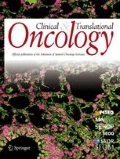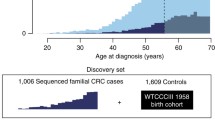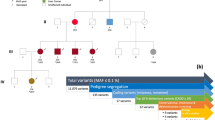Abstract
Purpose
A great proportion of the heritability of colorectal cancer (CRC) still remains unexplained, and rare variants, as well as copy number changes, have been proposed as potential candidates to explain the so-called ‘missing heritability’. We aimed to identify rare high-to-moderately penetrant copy number variants (CNVs) in patients suspected of having hereditary CRC due to an early onset.
Methods/patients
We have selected for genome-wide copy number analysis, 27 MMR-proficient early onset CRC patients (<50 years) without identifiable germline mutations in Mendelian genes related to this phenotype. Rare CNVs were selected by removing all CNVs detected at MAF >1% in the in-house control CNV database (n = 629 healthy controls). Copy number assignment was checked by duplex real-time quantitative PCR or multiplex ligation probe amplification. Somatic mutation analysis in candidate genes included: loss of heterozygosity studies, point mutation screening, and methylation status of the promoter.
Results
We have identified two rare germline deletions involving the AK3 and SLIT2 genes in two patients. The search for a second somatic mutational event in the corresponding CRC tumors showed loss of heterozygosity in AK3, and promoter hypermethylation in SLIT2. Both genes have been previously related to colorectal carcinogenesis.
Conclusions
These findings suggest that AK3 and SLIT2 may be potential candidates involved in genetic susceptibility to CRC.


Similar content being viewed by others
References
Ferlay J, Soerjomataram I, Ervik M, Dikshit R, Esteban-Jurado C, Mathers C, et al. GLOBOCAN 2012 v1.0, Cancer Incidence and Mortality Worldwide: IARC Cancer Base No. 11. Lyon: International Agency for Research on Cancer; 2013.
Lichtenstein P, Holm NV, Verkasalo PK, Iliadou A, Kaprio J, Koskenvuo M, et al. Environmental and heritable factors in the causation of cancer: analyses of cohorts of twins from Sweden, Denmark, and Finland. New Engl J Med. 2000;343(2):78–85.
Jiao S, Peters U, Berndt S, Brenner H, Butterbach K, Caan BJ, et al. Estimating the heritability of colorectal cancer. Hum Mol Genet. 2014;23(14):3898–905.
Ligtenberg MJ, Kuiper RP, Chan TL, Goossens M, Hebeda KM, Voorendt M, et al. Heritable somatic methylation and inactivation of MSH2 in families with Lynch syndrome due to deletion of the 3’ exons of TACSTD1. Nat Genet. 2009;41(1):112–7.
Jaeger E, Leedham S, Lewis A, Segditsas S, Becker M, Cuadrado PR, et al. Hereditary mixed polyposis syndrome is caused by a 40-kb upstream duplication that leads to increased and ectopic expression of the BMP antagonist GREM1. Nat Genet. 2012;6:699–703.
Fernandez-Rozadilla C, Brea-Fernandez A, Bessa X, Alvarez-Urturi C, Abuli A, Clofent J, et al. BMPR1A mutations in early-onset colorectal cancer with mismatch repair proficiency. Clin Genet. 2013;84(1):94–6.
Venkatachalam R, Ligtenberg MJ, Hoogerbrugge N, Schackert HK, Gorgens H, Hahn MM, et al. Germline epigenetic silencing of the tumor suppressor gene PTPRJ in early-onset familial colorectal cancer. Gastroenterology. 2010;139(6):2221–4.
Venkatachalam R, Verwiel ET, Kamping EJ, Hoenselaar E, Gorgens H, Schackert HK, et al. Identification of candidate predisposing copy number variants in familial and early-onset colorectal cancer patients. Int J Cancer. 2011;129(7):1635–42.
Riegert-Johnson DL, Johnson RA, Rabe KG, Wang L, Thomas B, Baudhuin LM, Thibodeau SN, Boardman LA. The value of MUTYH testing in patients with early onset microsatellite stable colorectal cancer referred for hereditary nonpolyposis colon cancer syndrome testing. Genet Test. 2007;11(4):361–5.
Nieminen TT, Abdel-Rahman WM, Ristimäki A, Lappalainen M, Lahermo P, Mecklin JP, Järvinen HJ, Peltomäki P. BMPR1A mutations in hereditary nonpolyposis colorectal cancer without mismatch repair deficiency. Gastroenterology. 2011;141(1):e23–6.
Fernandez-Rozadilla C, de Castro L, Clofent J, Brea-Fernandez A, Bessa X, Abuli A, et al. Single nucleotide polymorphisms in the Wnt and BMP pathways and colorectal cancer risk in a Spanish cohort. PLoS One. 2010;5(9):e12673.
Korn JM, Kuruvilla FG, McCarroll SA, Wysoker A, Nemesh J, Cawley S, et al. Integrated genotype calling and association analysis of SNPs, common copy number polymorphisms and rare CNVs. Nat Genet. 2008;40(10):1253–60.
Colella S, Yau C, Taylor JM, Mirza G, Butler H, Clouston P, et al. QuantiSNP: an Objective Bayes Hidden-Markov Model to detect and accurately map copy number variation using SNP genotyping data. Nucleic Acids Res. 2007;35(6):2013–25.
Purcell S, Neale B, Todd-Brown K, Thomas L, Ferreira MAR, Bender D, Maller J, Sklar P, de Bakker PIW, Daly MJ, Sham PC. PLINK: a toolset for whole-genome association and population-based linkage analysis. Am J Hum Genet. 2007;81(3):559–75.
Tomlinson I, Webb E, Carvajal-Carmona L, Broderick P, Kemp Z, Spain S, et al. A genome-wide association scan of tag SNPs identifies a susceptibility variant for colorectal cancer at 8q24.21. Nat Genet. 2007;39(8):984–8.
Azuara D, Rodriguez-Moranta F, de Oca J, Soriano-Izquierdo A, Mora J, Guardiola J, et al. Novel methylation panel for the early detection of colorectal tumors in stool DNA. Clin Colorectal Cancer. 2010;9(3):168–76.
Azuara D, Rodriguez-Moranta F, de Oca J, Sanjuan X, Guardiola J, Lobaton T, et al. Novel methylation panel for the early detection of neoplasia in high-risk ulcerative colitis and Crohn’s colitis patients. Inflamm Bowel Dis. 2013;19(1):165–73.
Fernandez-Rozadilla C, Cazier JB, Tomlinson I, Brea-Fernandez A, Lamas MJ, Baiget M, et al. A genome-wide association study on copy number variation identifies a 11q11 loss as a candidate susceptibility variant for colorectal cancer. Hum Genet. 2014;133(5):525–34.
Li Z, Yu D, Gan M, Shan Q, Yin X, Tang S, Zhang S, Shi Y, Zhu Y, Lai M, Zhang D. A genome-wide assessment of rare copy number variants in colorectal cancer. Oncotarget. 2015;6(28):26411–23.
Krepischi AC, Achatz MI, Santos EM, Costa SS, Lisboa BC, Brentani H, et al. Germline DNA copy number variation in familial and early-onset breast cancer. Breast Cancer Res. 2012;14(1):R24.
Zhou WJ, Geng ZH, Chi S, Zhang W, Niu XF, Lan SJ, et al. Slit-Robo signaling induces malignant transformation through Hakai-mediated E-cadherin degradation during colorectal epithelial cell carcinogenesis. Cell Res. 2011;21:609–26.
Patai AV, Valcz G, Hollosi P, Kalmar A, Peterfia B, Patai A, et al. Comprehensive DNA methylation analysis reveals a common ten-gene methylation signature in colorectal adenomas and carcinomas. PLoS One. 2015;10(8):e0133836.
Beggs AD, Jones A, Shepherd N, Arnaout A, Finlayson C, Abulafi AM, et al. Loss of expression and promoter methylation of SLIT2 are associated with sessile serrated adenoma formation. PLoS Genet. 2013;9(5):e1003488.
Alvarez C, Tapia T, Cornejo V, Fernandez W, Munoz A, Camus M, et al. Silencing of tumor suppressor genes RASSF1A, SLIT2, and WIF1 by promoter hypermethylation in hereditary breast cancer. Mol Carcinog. 2013;52(6):475–87.
Wang J, Yang DL, Chen ZZ, Gou BF. Associations of body mass index with cancer incidence among populations, genders, and menopausal status: a systematic review and meta-analysis. Cancer Epidemiol. 2016;42:1–8.
Knudson AG. Hereditary cancer: two hits revisited. J Cancer Res Clin Oncol. 1996;122(3):135–40.
Chopra AS, Kuratnik A, Scocchera EW, Wright DL, Giardina C. Identification of novel compounds that enhance colon cancer cell sensitivity to inflammatory apoptotic ligands. Cancer Biol Ther. 2013;14(5):436–49.
Laitinen VH, Akinrinade O, Rantapero T, Tammela TL, Wahlfors T, Schleutker J. Germline copy number variation analysis in Finnish families with hereditary prostate cancer. Prostate. 2016;76(3):316–24.
Moir-Meyer GL, Pearson JF, Lose F, Australian National Endometrial Cancer Study Group, Scott RJ, McEvoy M, et al. Rare germline copy number deletions of likely functional importance are implicated in endometrial cancer predisposition. Hum Genet. 2015;134(3):269–78.
Acknowledgements
This work was supported by grants from the Fondo de Investigación Sanitaria/FEDER (11/00681, 11/00219), and COST Action BM1206 (EUCOLONGENE). AJB-F is supported by a contract from CIBERER (Centro de Investigacion Biomedica en Red de Enfermedades Raras). CIBERER is funded by the Instituto de Salud Carlos III. We are sincerely grateful to the patients who generously contributed to this study.
Author information
Authors and Affiliations
Corresponding author
Ethics declarations
Conflict of interest
The authors declare that they have no conflict of interest.
Ethical approval
All procedures performed in studies involving human participants were in accordance with the ethical standards of the institutional and/or national research committee and with the 1964 Helsinki declaration and its later amendments or comparable ethical standards.
Informed consent
Informed consent was obtained from all individual participants included in the study.
Electronic supplementary material
Below is the link to the electronic supplementary material.
Rights and permissions
About this article
Cite this article
Brea-Fernandez, A.J., Fernandez-Rozadilla, C., Alvarez-Barona, M. et al. Candidate predisposing germline copy number variants in early onset colorectal cancer patients. Clin Transl Oncol 19, 625–632 (2017). https://doi.org/10.1007/s12094-016-1576-z
Received:
Accepted:
Published:
Issue Date:
DOI: https://doi.org/10.1007/s12094-016-1576-z




